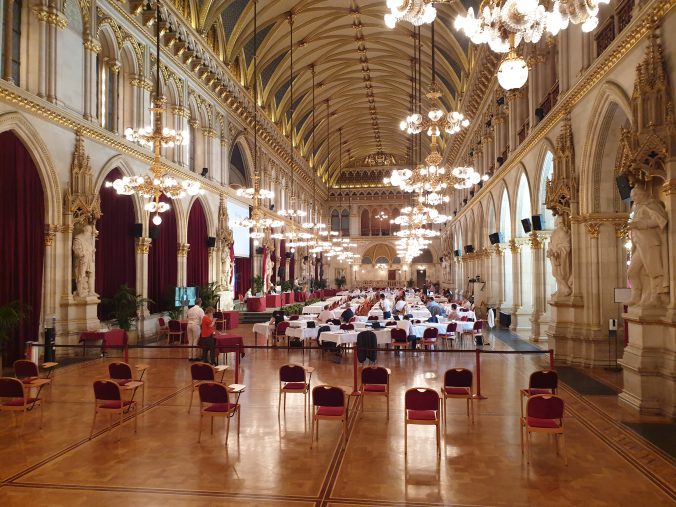Rede im Gemeinderat am 26. Jänner 2022
Sehr geehrte Kolleginnen, sehr geehrte Kollegen, Sehr geehrte Stadträtin,
Jetzt großer Themenwechsel oder Bühnenwechsel würde man sagen. Wir sind bei der Kultur angelangt.
Es geht um die Probleme der Kulturszene und irgendwie geht’s auch hier um Nachhaltigkeit, deshalb melde ich mich jetzt zu Wort.
Wir reden über den Kultursommer. Beziehungsweise, fangen wir anders an: sehr viele Menschen, fast alle Menschen sehen ähnliche Probleme, mit der die Kulturszene im Moment konfrontiert ist. Die vielen Lockdowns, die vielen Verschiebungen haben dazu geführt, dass sie eigentlich dauernd umplanen müssen. Das Publikum hat am Anfang noch mehr mitgemacht, aber jetzt nicht mehr ganz so, und mit Omikron traut sich das Publikum noch weniger zu kommen.
Jetzt geht es eigentlich darum, neue Anreize zu finden.
Wie kommen die Menschen wieder in die Kulturinstitutionen?
Wie trauen sie sich wieder zu Events zu gehen und was könnten wir da als Stadt dazu machen?
Eine solche Sache ist der Kultursommer, der ja sowohl zum Ziel hat, dass die Kulturschaffenden Auftrittsmöglichkeit kriegen und dass die Leute eine gute Stimmung haben und dass es wieder mehr Hoffnung gibt.
Das ist ein Ziel, das wir alle erreichen wollen.
Ja, und das hat auch funktioniert.
Wir Abgeordnete haben von der Stadträtin alle dieses Buch bekommen, das Kultursommerbuch. Da wird vermittelt, dass es wirklich eine wunderbare Stimmung gegeben hat.
Es gibt tolle Fotos! Es ist ein feines Büchlein und es zeigt, Wien geht’s gut.
Was wir aber leider nicht in dem Buch finden – und das gilt auch als Projektbericht des Kultursommers – ist, wie haben die KünstlerInnen eigentlich davon profitiert?
Hat der Kultursommer wirklich das geschafft, was wir von ihm erhofft haben?
Wir haben 2021 sechs Millionen in diese Projekt zur Belebung der Kulturszene investiert und wir sehen jetzt viele schöne bunte Bilder, aber wenig aussagekräftige Zahlen.
Stattdessen viele erstaunliche Auswahl der Zahlen:
Es gibt nichts darüber, wie viele Künstlerinnen und Künstler hier aufgetreten sind, nichts darüber, wer diese Künstlerinnen waren.
Stattdessen finden wir Zahlen zu den BesucherInnen, wir finden Zahlen über das Alter der BesucherInnen und erstaunlicherweise auch über die Nationalität der BesucherInnen, auch über deren Haushaltseinkommen.
Aber wir finden keine Zahlen dazu, wie viele Künstlerinnen aufgetreten sind? Wir finden nicht, wie viele Männer und Frauen aufgetreten sind?
Wir finden nicht, wie viel sie beim Auftritt verdient haben, wie hoch der Anteil der Verdienste der KünstlerInnengagen überhaupt an der Fördersumme war? Wir finden nichts darüber wie viel Geld in die Organisation oder in die Infrastruktur geflossen ist.
Solche Fragen werden leider im Band nicht beantwortet. Ich hoffe sie werden noch nachgereicht. Wir haben ja die große Budgetsitzung dann im Sommer.
Ansonsten, muss ich sagen, ist der Band wunderbar und wir können uns alle an einen schönen Sommer erinnern und hoffen, dass der nächste auch wieder so schön wird.
Wenn wir diese Fragen zu den statistischen Zahlen nicht beantworten können, können wir leider auch die gesteckten Ziele nicht genau analysieren.
Wir können also nicht analysieren, ob ein Kultursommer die Ziele erreicht hat, die wir eigentlich erreichen wollten, nämlich eine Belebung der Szene.
Einen barrierefreien Zugang haben wir im Großen und Ganzen mit den Gratiseintritten erreicht. Aber oft sind trotzdem nicht viele Zuseher gekommen und wir wissen nicht, warum die eigentlich nicht gekommen sind. Die sind zwar offenbar befragt worden, aber es finden sich keine Antworten in dem Buch. Ich hoffe, das folgt noch, ich hoffe dieser Teil der Evaluierung wird uns weiterhelfen.
Aber wir wissen auch, es wird noch andere Maßnahmen brauchen, und unser Vorschlag als grüne Fraktion wäre, die KünstlerInnenszene nicht erst im Sommer mit dem Kultursommer zu verstärken, sondern ihnen schon jetzt mehr Auftrittsmöglichkeiten zu bieten. Beziehungsweise schon jetzt die Szene zu unterstützen, und zwar mit einer einfachen Maßnahme. Viele von Ihnen kommt sie vielleicht bekannt vor: der neue Wiener Kulturgutschein.
Was soll das sein?
Der Kulturgutschein soll Sie an den Gastrogutschein erinnern, so ähnlich soll er auch funktionieren.
Wir wünschen uns, dass jeder Haushalt in Wien zwei Eintrittskarten für einen beliebigen von der Stadt Wien geförderten Kulturverein oder eine Kulturinstitution bekommt und damit dann quasi einen gratis Eintritt in die Institution hat. Damit wird es dort mehr Publikum geben, auf der einen Seite, und auf der anderen Seite haben die Institutionen, die Vereine, die Eventorganisationen durch diese Eintritte mehr Einkommen. Die Kosten dafür müssen natürlich von der Stadt Wien übernommen werden.
Das ist eine Form von Förderung, die allen helfen würde. Eine Förderung, die gute Stimmung macht, und vor allen Dingen, zu der wir schon Ideen haben, wie man sie umsetzen könnte.
Es gibt schon Strukturen, auf die man sich bauen kann. Es gibt schon Umsetzungsmöglichkeiten und man könnte es innerhalb von ein, zwei Monaten ganz schnell umsetzen –
Ich bitte Sie deshalb, diesen Antrag der Grünen auf einen Kulturgutschein für Wien zu unterstützen und danke Ihnen für Ihre Aufmerksamkeit. (Beifall.)
Unser Antrag zur Umsetzung eines Kulturgutscheins wurde in der Sitzung am 26.Jänner 2022 leider ohne Kommentar abgelehnt.

